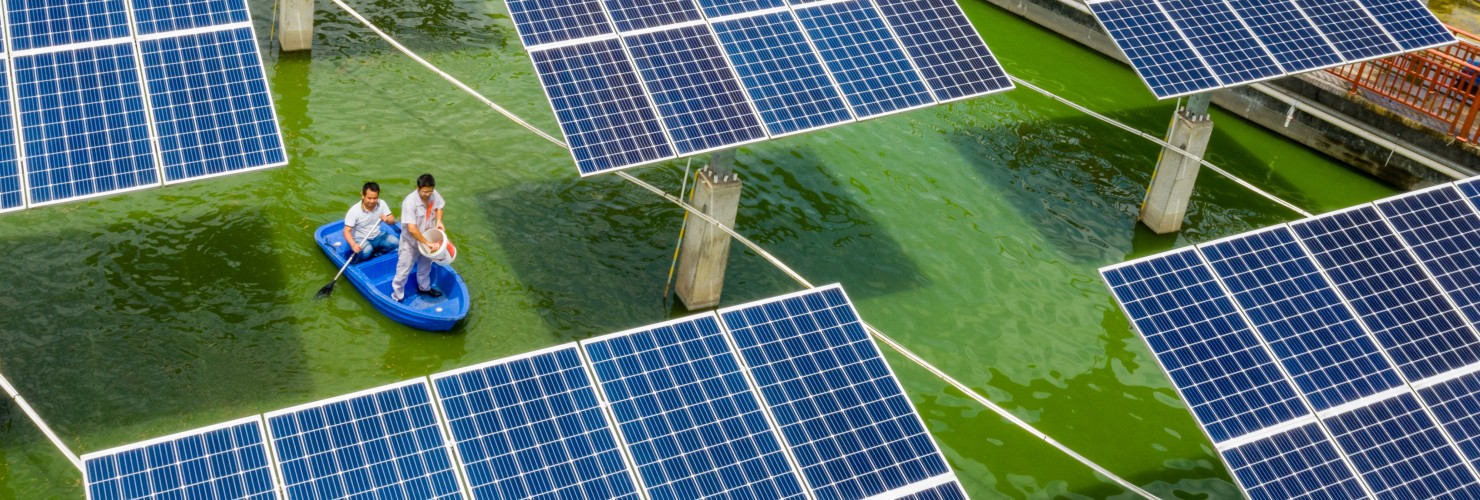

Green-tech rivalry will complicate US-China climate cooperation
Chinese experts prize collaboration, but also predict a race for technology and markets, says Nis Grünberg. This is the third in a series of short analyses that looks at China’s systemic competition and normative rivalry with the US and the EU. A look beyond the Beijing leadership shows how far debates about the features of political systems and the power to interpret events reach into Chinese society – and possibly shape the country’s actions.
The climate summit COP26 in Glasgow showed that there are still issues on which China and USA can co-operate. Still, the Glasgow Climate Pact is considered too weak to meet the Paris Agreement’s target to limit global warming to 1.5C. But China and the US, the two biggest emitters of carbon dioxide, signing a declaration about climate co-operation was a success. This agreement to better coordinate their climate policy helped COP26 reach a final agreement and lowered the temperature on tense US-China relations. “Sino-American cooperation remains the only right choice,” explained China’s chief envoy Xie Zhenhua.
But this co-operative stance on climate issues cannot gloss over the fact that the Sino-American relationship is entering a new era of fierce competition over green technology. According to Fu Guanyun, researcher at the Energy Research Institute of China’s National Development and Reform Commission, the two countries are already entering a “new round of technological competition over green industries and technology”. Chinese observers are all too aware that climate-policy co-operation will open a new front in technology rivalry.
The founding realization is that international agreement on climate action is translated into very different national approaches – concrete climate policy serves national interests as much as it serves global climate goals. China has the ambition to become the leader of what Hu Angang, Director of the Center for China Study at Tsinghua University, calls the “fourth industrial revolution”: green tech and sustainable solutions, and this can complicate trade relations and technological competition with foreign partners and foreign competitors alike.
China is inserting its green-technology push into state capitalist policymaking
Wang Wen, dean of the Chongyang Institute for Financial Studies at Renmin University, has warned about an era of new "power games" and international competition over the "rules of low-carbon economics." In technology, finance, and trade, he notes, "strategic cooperation, interest games and trade competition will become the main battlefields of competition among major powers on the road to carbon neutrality." While the US approach mainly revolves around leveraging market incentives and technological edge, China is inserting its climate action and green-technology push into its state capitalist policymaking practice.
Industrial policy, state-guidance, and active partnerships between state-owned companies (SOE) and private innovators are part and parcel of Beijing’s aim to boost domestic green tech and new industries key to climate adaptation. This will mean more competition in areas crucial for the transition from fossil to renewable energy systems – electrolysers for green hydrogen production, new energy vehicles, carbon-capture technology and more.
Dai Xingtao, manager of a Shandong-based producer of electrolysers, points out that innovative private companies should see SOEs more as potential collaborators than as competitors. According to him, combining the scale and markets of SOEs with the technology developed by private innovators will drive the green hydrogen market in China.
China’s state capitalism has shown itself to be a formidable competitor on the world stage in advanced fields such as smart grids, battery technology – and there’s every reason to believe China’s state capitalists can succeed in more areas of green tech. China’s take-over of the solar-panel industry shows it can establish and scale industries around new technologies and to challenge foreign competitors on price and volume. China is also beginning to dominate in batteries, e-vehicles and vital materials for green tech. With “new energy potentially being to industry what the internet was to it twenty years ago”, competition will only intensify, says Guan Qingyou, a researcher at the Chinese Academy of Social Science.
Beijing is aiming at technological leadership in green tech
By providing active state support, Beijing is aiming to build competitive edge and technological leadership in strategic emerging industries, especially in green tech. A task force of the Research Center for Industrial Economics, part of the Chinese Academy of Social Science, concluded this must be a priority in the light of growing international competition and tensions. The goal must be for China to advance its overall science and technology system from “following, to being peer and leading the race” also in green tech, it said.
American observers are well aware of China's advantages in green energy and its negative impact on the long-term economic outlook of the US in this strategic emerging market. The realpolitik dimension of climate policy serving national economies does not escape the Chinese debate either. Referring to the disruption that saw China’s solar manufacturers take over that market, Dong Ding of Tsinghua University’s Strategy and Security Research Center points out that “the greatest possible space for developing scientific and technological cooperation needs to be put on top (on the basis) of seeking to strengthen one’s own strength.” Harmonizing international cooperation and national self-interest will be tricky.
With the technological ambitions behind climate action driven by state capitalism, climate policy will increasingly be a factor in the policy approach that has led US President Joe Biden to warn about “extreme competition,” and Europe to declare a “systemic rivalry” with China. The recent EU-US Joint Technology Competition Policy Dialogue illustrates how sensitive the issue is, even in the much less complicated US-EU relationship. Beijing’s approach will deepen this ideological competition ¬– and Western complaints about economic practices perceived as unfair will come to encompass the green-tech sector vital for climate protection.
Global cooperation on climate politics is essential, but it will be challenged by economic competition as the US and China vie to protect their interests. The Glasgow Climate Pact and the US-China joint declaration create legitimacy by showing that nations are working towards the same ends. China’s approach to technology will be good for green tech innovation. But it will also intensify the clash with EU and US ideas of fair competition. According to Tsinghua Professor Ma Linwei, the task now at hand is to stop the competition engendered by conflicting national climate policy pathways from becoming “malevolent”.
Acknowledgements
This analysis is part of a series supported by a Ford Foundation grant and is licensed to the public subject to the Creative Commons Attribution 4.0 International License.

